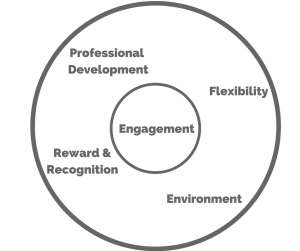We often write about recruitment, performance development, and other measures business owners can take to attract and retain great people. All of this is important. We know hiring the right people into the right jobs is crucial to supporting and growing your business. What about employee engagement?
More than remuneration or conditions, more than professional development, it is work culture that keeps good staff in roles. Employee engagement is central to creating a culture where people want to stay with the company long term.
As business owners and leaders, it’s easy to get caught up in the numbers – clients, products, profit and growth while neglecting the ‘softer’ aspects of leadership.
However, effective employee engagement is crucial to your business, because lowering your attrition rate and keeping the best staff within your business is the single most effective way to create value for your clients and set your business on track for success.
Engagement drives individuals to go that extra mile voluntarily and to do something not because they have been told to but because they want to.
So, how do you promote employee engagement in your business?
Engagement isn’t only about the odd staff party and birthday morning tea. There are many ways to improve your employees’ experience and, consequently, keep them engaged, making them an active, positive part of your business.

Flexibility
An increasingly popular way to improve your employees’ work experience is through flexible working policies and practices.
‘Flexible’ working isn’t only working from home. It covers a lot of territory, from compressed hours that then enable an extra day off each fortnight, to altered hours of work, such as working 10:00am-6:00pm in order to do the school drop-off each morning. It may also include temporary reduction in hours to attend studies or prepare for retirement or purchased leave to access additional paid leave to travel.
Professional Development
Opportunities for professional development are another key driver of employee engagement.
Coaching and mentoring are a great way for employees to grow within the business and learning from others about their personal journey and experiences.
Alternatively structured learning courses are a great way for employees to build skills they require to meet the changing demands of their role for the future or to progress within the organisation on short or long term basis.
Environment
Providing an environment where employees can excel personally and professionally can go a long way in making them engaged. Welfare of employees is not simply an individual or personal matter for each employee, but rather something that a business can take a proactive step in promoting.
Reward and Recognition Programs
Years of service, outstanding results on a performance appraisal review or completion of a project are all ways to reward employees for great work.
No matter the size of your business or the resources that you have access to, there are always ways to reward employees. Learn what motivates your employees as to what reward will work best: from a simple thank you, to gifts or a bonus or additional leave.
Employees are an important part of your business and your brand, so be proactive in developing engaged employees that are with your business well into the future.
Need some help developing your employee engagement strategy? At Small Business Society, we can help you with that.
Be one of the first to receive our new Human Resources articles each month.
Sign up to Small Business Society and receive our newsletter each month plus other great resources to assist you on your Human Resources journey.
Are your leaders the best they can be?
Sign up to Small Business Society and we will send you our FREE 8 point plan for effectively supporting and developing your leaders and managers.
FREE 8 point plan for successful leaders
About Kate Tongue
Kate Tongue is the founding Director of Small Business Society.
She is a qualified and experienced Human Resources professional with more than 10 years of experience across the private and public sectors.
Her particular interest and experience is in managing the employee life cycle, delivering process improvements, and Human Resource strategy.
Looking for more information on the various stages of the employee life cycle or Human Resources in general? The following may interest you.
Articles to assist you with your leaders:
Develop successful leaders and managers
Articles to assist you with recruitment and probation:
FAQs about probationary periods answered
How to get the most out of reference checks
Do you know your Human Resources terms?
15 must know HR terms
Plus lots more information and advice:
Small Business Society Blog